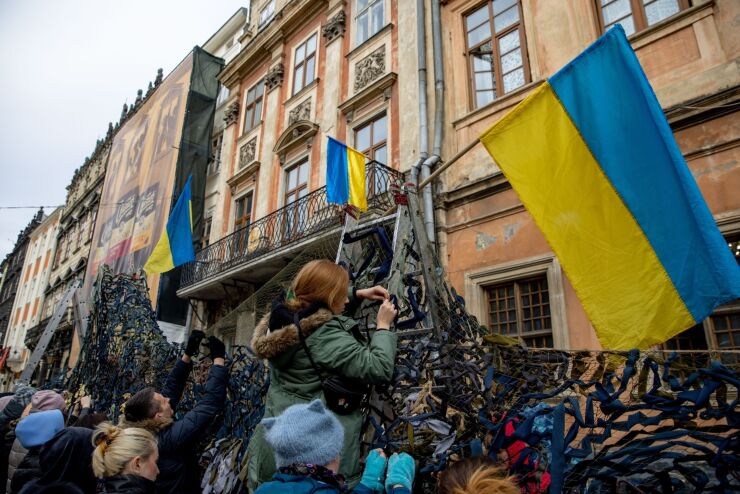A group of seven Microsoft Dynamics resellers — normally fierce rivals — have put aside their differences to aid their Ukrainian team members amid the Russian invasion. Taking part in this effort are ArganoArbela, Clarity, Global Mediator, OntargIT, Smart Business and
The
Ajspur wondered how much more effective they could be if they combined work and he quickly drafted an email to the other CEOs to set up a call. All of them replied within 30 minutes, eager to find ways to coordinate. He conceded he wasn't entirely sure what they would talk about on the call, but felt it was important they come together in some way, since their individual goals were largely the same.
"I can tell you, I got so nervous in the evening [after sending the email]! Half an hour before the call, I said, ''What am I doing, what do I tell these people?' and was just kind of almost getting cold feet because I wasn't sure what we were going to talk about," he said, though his fears were allayed as soon as the call started, as the other CEOs were eager to discuss strategy.
OntargIT CEO Volodymyr Svyrydenko — who was in Ukraine when the invasion began and only recently returned to the U.S. — found the call productive. The conversation was mostly a brainstorming session where they discussed various ideas about how to best support their team members in Ukraine.
"We went through different subjects, [like] purchasing bulletproof vests for our team members, for Dynamics people, in case they would be called to duty in the armed forces. There was a huge list of different options we discussed but then settled on a narrower set of specific initiatives to support," he said.
One of the first things they ultimately agreed upon was providing team members with mental health services, as being in a war zone was likely taking a toll. The companies now employ a group of four psychologists, some of whom specialize in war refugees, to help team members process the events around them.
'We were all just helping each other out'
They have also spent a significant amount of time relocating team members who have needed to move, whether to another part of Ukraine or a different country entirely. This involved a great deal of logistics, as they had to make sure there was not only housing available for them, but safe transportation to those places. Ajspur said he personally went to Romania to help find apartments; others went to Poland or Hungary. He noted that it didn't matter which company the staff worked for; if they needed help, they would get it.
"One of our competitor colleagues was stationed near the border of Ukraine and Romania, so when someone came, no matter the company, they'd take care of them and send them to the apartments I found. So we were all just helping each other out. It was amazing to see us come together when, normally, we're all fighting against each other," he said.
Svyrydenko said the relocations were not a centralized effort because the team members were all over the country. He said they weren't sure if it was a good idea to have one bus picking up everyone, so the group also hired a full-time support person to manage the logistics. They also hired another full-time person to handle communications with people on the ground in Ukraine, who he said is constantly forwarding messages and talking to people, making sure they're "medically in an OK condition." He added that the group has also given a lot of direct financial support to handle the expenses of moving.
Svyrydenko noted that the mood of team members in Ukraine is a strange combination of banality and tragedy. "I understand the feelings — with the shellings and missile attacks happening around the country, there is no safe space. You just believe that the probability is low that you would be targeted, and that's how people live," he said.
These relocations were never casual affairs, and almost always needed a great deal of logistical support. Charlotte McCormick, president of ArganoArbela, noted that one colleague and their family made it across only after their van broke down five times and ran into a ditch. Another colleague made it across the Romanian border (without her husband, who was not allowed to leave the country), much to McCormick's relief. She said there's not a lot they can do from the U.S., which makes seeing what they can do all the more gratifying.
"For us, it was always about helping our people, doing whatever we could do to help them, so this [effort is] another avenue, another way, to brainstorm and figure out what we might not have thought of and what our best practices could be," she said.

Because they are Microsoft Dynamics companies, it should not be surprising that they've utilized their own products in these efforts. McCormick noted that her own firm built a Microsoft PowerApp that allows people to check in so they can know the team members are safe at the moment and what they need. This app has given everyone some peace of mind in a very difficult situation.
Ajspur said they are continuing to fundraise for the campaign, with a goal of $1 million; so far, they have raised about $60,000. The money will support efforts not only during the war but afterward as well.
"When the war is over and it's safe to travel, we will help out," he said. "People will need new homes, apartments, offices. So that's our long-term goal, to rebuild."






